China and Covid19
Growing Discontent on Chinese Social Media over Harsh Measures: “Why Can’t China Ease Covid Restrictions?”
Some say this year is not 2022 but “2020too”, suggesting that everything has gone back to the initial stage of the Covid outbreak.
Published
2 years agoon

As China is seeing its biggest surge in Covid cases since 2020, official media channels are emphasizing the need to stick to China’s zero-covid approach. But many on social media are increasingly dissatisfied with the harsh measures and wonder if this is still the best way forward.
As Omicron is spreading throughout mainland China, mass testing, strict quarantine rules, and lockdowns have become part of daily life again. As discontent about the lockdowns has recently been growing on Chinese social media, the hashtag “Why Can’t China Lift Safety Measure Just Like Foreign Countries?” (#中国为什么不能像国外一样取消防疫措施#) is top trending on social media platform Weibo, where it had received over 490 million views on Wednesday.
The hashtag was initiated by Chinese economic news outlet National Business Daily (每日经济新闻) in light of a recent CCTV interview with renowned epidemiologist Liang Wannian (梁万年), a strong advocate of China’s dynamic zero-Covid strategy and the leader of China’s Covid-19 expert panel. A fragment of the interview went viral on Chinese social media, receiving over 140,000 likes on Weibo alone.
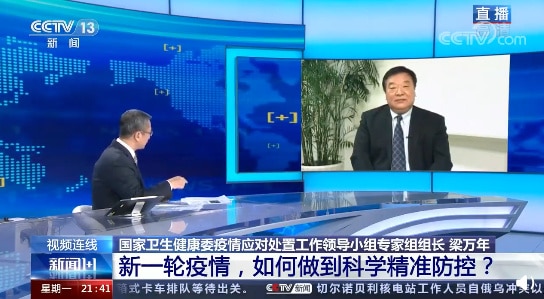
In the interview, Liang responded to a question about many foreign countries recently easing Covid safety measures or removing them altogether, posing a stark contrast to China where new local outbreaks – China reported 37,000 cases this month – are met with an ongoing pursuit of ‘zero Covid.’ How much longer can China keep up its strategy?
According to Liang, protection of the people comes first for China, epitomized by Xi Jinping’s now-famous “put people and their life first” slogan (“人民至上,生命至上”). Unlike some other countries, China has not chosen for a strategy where restrictions are removed and Covid is no longer seen as a critical threat to society. Protecting the people is more important than a so-called ‘herd immunity,’ Liang says. If the virus would run its course, people would suffer – especially the elderly and the vulnerable. Instead, China is sticking to its strict measures and meanwhile is increasing its vaccination rates and winning more time for more research and development of Covid-19 treatment.
Liang’s comments, which emphasize that China’s current strategy is the best choice for the people and the country, send out a different message than the remarks recently made by Jiang Rongmeng (蒋荣猛). Jiang, vice-president of Beijing’s Ditan Hospital, said in an interview that Omicron infections were milder than a common flu and “more like a cold.” That interview later seemed to be censored on social media, with some people questioning China’s strict measures for the outbreak of something “like a cold.”
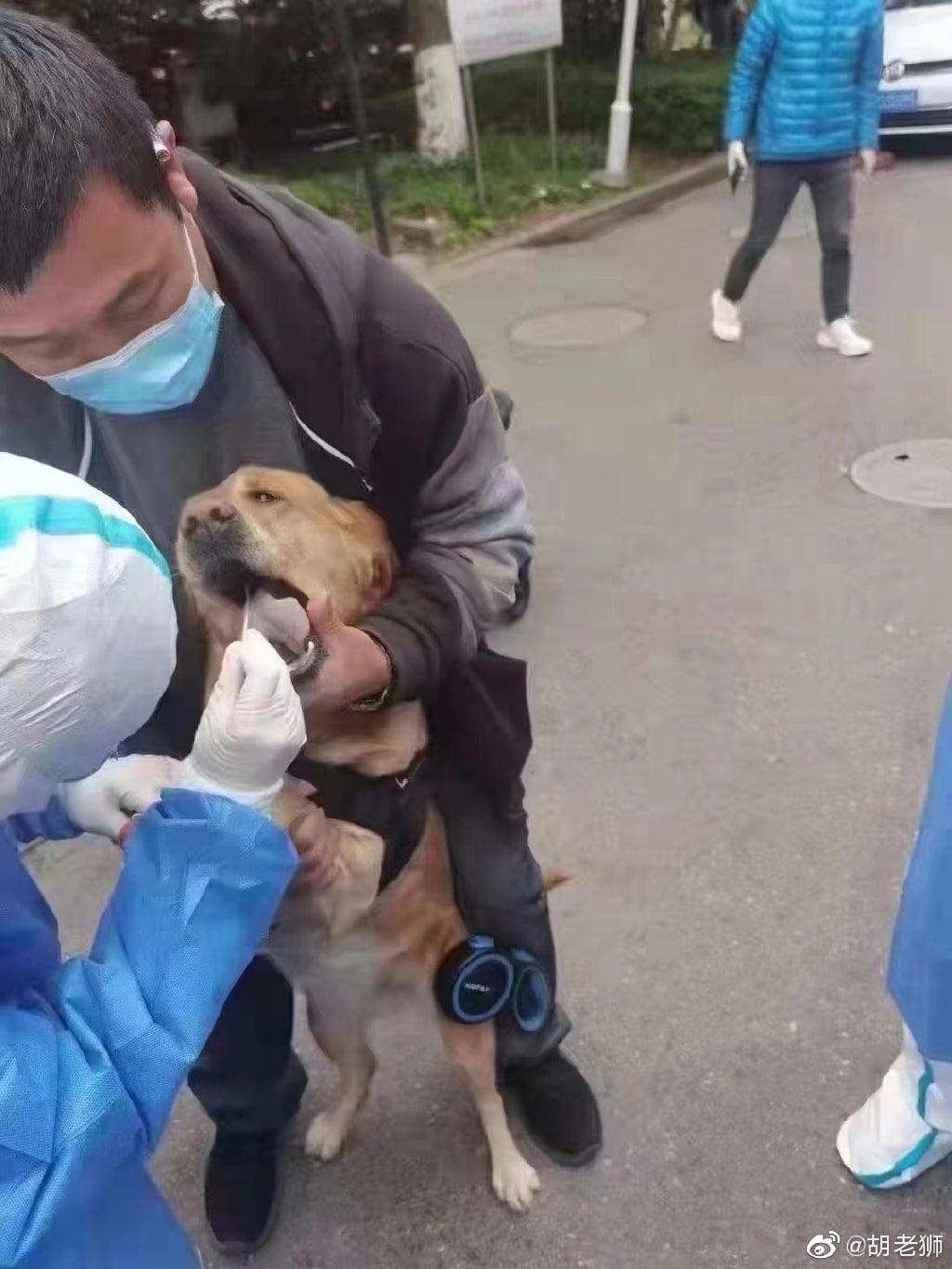
One person posted this photo on Weibo of a dog allegedly getting a swab test for Covid-19, reiterating the comments made by Dr. Jiang about Omicron being “milder than the flu.”
Although many people on Chinese social media are fully supporting China’s zero-Covid approach, the discussions triggered by the “Why Can’t China Lift Safety Measure Just Like Foreign Countries?” hashtag are also heavily controlled. Over the past months, China’s Covid policy has seen more online criticism.
Shifting Online Sentiments
Since the outbreak of the novel coronavirus in Wuhan in late 2019, China’s success in controlling the spread of the virus has been praised by many. The cost of keeping Covid-19 cases close to ‘zero’ was met with a lot of understanding and approval from netizens, such as when the city of Chengdu entered ‘wartime mode’ in December of 2020 after seven domestic Covid-19 were detected; or when eleven million residents of Shijiazhuang were banned from leaving the city and had to undergo tests in January of 2021; or when Shanghai Disneyland closed its doors in November of 2021 and 34,000 visitors needed to be tested after a single Covid case among the public, and so on.
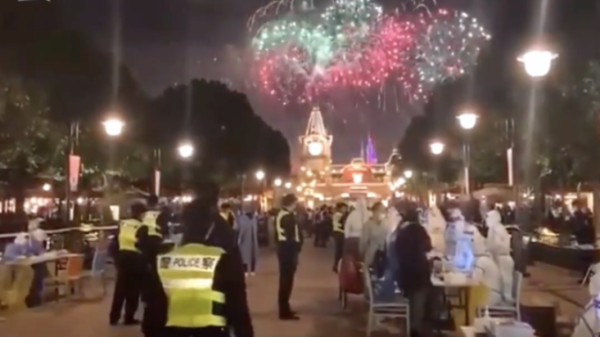
Testing done in Disneyland Shanghai.
But by late December of 2021 and early January of this year, online sentiments seemed to shift as the country saw an increase in local outbreaks while authorities still tried to wipe out all traces of Covid-19, especially in light of the 2022 Beijing Olympics.
Online criticism of China’s extreme efforts to contain Covid-19 also came earlier, in November of 2021, when a pet dog was killed by epidemic prevention workers in the city of Shangrao while its owners were being quarantined. People were outraged and blamed the Shangrao government for its seemingly indifferent response to the incident.

After home security cameras captured how health workers killed a pet dog in a locked-down compound, there was a wave of online anger.
The strict lockdown in the city of Xi’an, beginning on December 22nd of 2021, triggered anger and disbelief online over the way in which local authorities were managing the Covid-19 outbreak and the lockdown itself. Many residents dealt with food shortages, some were forced to leave their homes for quarantine in the middle of the night, and others dealt with the consequences of a lack of an efficient and speedy response to people’s need for urgent medical care.
After one pregnant woman suffered a miscarriage in front of the hospital gate – she was not allowed to enter due to nucleic acid test procedures – the public’s anger reached a boiling point. Although the hospital in question later apologized, the anger did not subside. “Are we really fighting this epidemic to save lives?,” one popular blogger wrote at the time.
When another pet dog was beaten to death by health workers in early March of 2022 in the city of Huizhou, many were outraged that such an incident could happen again: “This epidemic has been going on for several years, why does this keep happening? First Shangrao, now Huizhou. It’s heartbreaking.”
Shortly after the Huizhou dog incident, footage showing chaotic scenes at the Shanghai Sixth People’s Hospital circulated online. The hospital was sealed after a patient tested positive for Covid. Nurses who allegedly felt they were not given enough protective measures to treat Covid-19 patients were still forced to work, leading to actual physical altercations between medical workers. One post about the incident received over 143,000 likes on Weibo, with some calling the incident “shameless.”
It seems that the Canton Fair Complex was definitely not the place you’d want to be at last Friday, as everyone got stuck there and needed to get tested after one or more visitors were suspected of having covid (red qr code). pic.twitter.com/mm97JFNJFs
— Manya Koetse (@manyapan) March 14, 2022
On March 11, thousands of people got stuck at the China International Beauty Expo (CIBE) in the Canton Fair Complex (广交会展馆), and needed to get tested after a member of staff tested positive for Covid. After videos showed a mass of people in one of the halls, more netizens were openly questioning if this is the right way forward for China’s Covid approach.
China’s ‘2020too’
As mainland China is now facing its worst Covid-19 outbreak since the height of the pandemic in 2020, people in Shanghai, Shenzhen, and other affected regions are again facing tough restrictions in light of the battle against the virus.
One Weibo user recommended Shanghai residents to keep a “go bag” at hand with a toothbrush, an extra pair of underwear and socks, and some small blankets or sleeping bags just in case they get stuck at work or elsewhere due to the Covid measures – one Zhengzhou woman was recently quarantined inside a hotpot restaurant for three days.
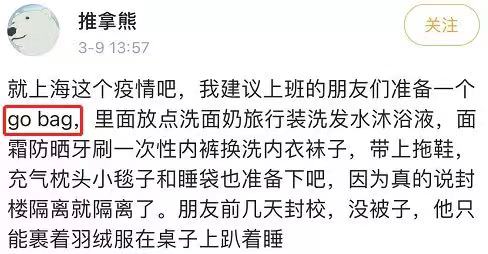

Due to the increase in temporary, local lockdowns, some on WeChat and Weibo have dubbed this year as China’s “2020too” – a wordplay on the English pronunciation of “2022” -, saying that it sometimes feels as if everything has gone back to the initial stage of the Covid outbreak back in 2020. “I find it so hard to believe that the 2022 I was looking forward to has turned into another 2020 [2020too],” one Weibo user writes.

A social media post by a Shanghai resident who tested positive for Covid-19 has also triggered discussions regarding China’s Covid-19 approach. In the lengthy post titled “A Shanghai Resident’s Covid Records” (“一个上海居民的新冠记录”), the Weibo user nicknamed ‘Hemuch’ described the utter chaos and inconvenience of staying at a central quarantine location for a few days.
‘Hemuch’ tested positive for Covid19 during a community test round on March 18. Although they did have a fever that day, it was gone the next day. When Hemuch tested positive again on the 19th, they were bombarded with calls from various health workers regarding quarantine but did not receive clear information on where they were going or what they needed to prepare. On the morning of the 20th, they were eventually transferred to quarantine at a local hospital together with other people who tested positive. ‘Hemuch’ describes how on the 23rd of March, after four days, not a single doctor or nurse has come to check on the patients: no tests, no temperature checking, no medication. A 90-year-old patient suffering from high blood pressure who stayed in the same room allegedly also did not receive proper care nor her prescribed drugs. The Shanghai resident further writes that their mother, who also had to be isolated, was sent to another hospital where there were no beds – she spent the first night on the floor in the hallway.
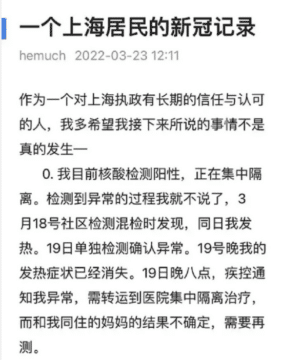
The social media post triggered many questions. Why were asymptomatic patients sent to a hospital where not only they were not receiving care, but actually were worse off than in their own home? Why were people with no symptoms, or minor ones, taking up the hospital beds of people who actually need life-saving care? “Can we alleviate the pressure of this ‘social epidemic’?”, ‘Hemuch’ wondered.
Another person responded to the post (update: now censored): “Medical resources are being wasted. Other patients can’t normally see a doctor. Healthcare workers are exhausted. Entire neighborhoods where people are not testing positive are locked down for days. So many people are losing their jobs because shops are closed.”
“This epidemic is turning people crazy, really! One policy hasn’t even become clear before the next policy is issued, new policies keep getting introduced and are updated all the time!” Another commenter asks: “How many years have passed? What’s the difference between now and 2020?”
United in the Fight Against Covid19?
The growing discontent on Chinese social media is being met with increased efforts by state media and official channels to promote China’s Covid strategy and ease existing concerns. Expert views from Liang Wannian or renowned doctor Zhang Wenhong (张文宏) are specifically pushed forward by Chinese media, emphasizing that the potential death toll of relaxing Covid measures would be too high and that China cannot afford to “lie flat” (“躺平”) and let the virus run its course.
Weibo as a platform is also actively promoting a positive attitude regarding China’s fight against the virus and is updating posts directly related to concerns about local Covid measures.
One example is the post below by a Shanghai resident, where the author describes that they are in a locked-down compound and cannot get an ambulance for their father who needed urgent care. Weibo later added a sticky bar to the post with an update saying that the father, albeit hours later, was finally admitted to a local hospital.
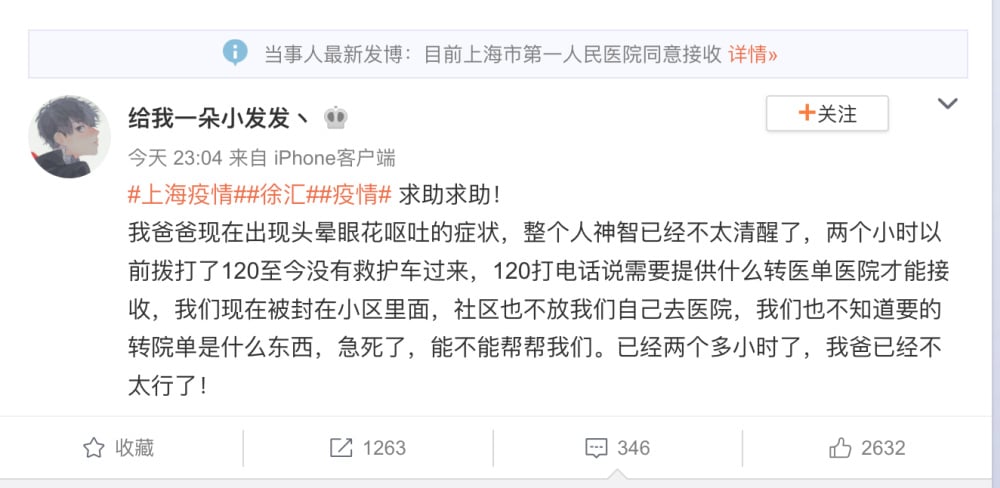

On Weibo, by Weibo, poster saying “United in the Fight against the Epidemic.”
While calls for easing existing measures are growing, there are also many netizens who still strongly support China’s Covid-19 approach.
“I don’t understand why you would want to remove the epidemic measures? Open it all open, ignore everything and just live with virus, are you kidding me? The only reason why you think that Covid19 is not serious or Omicron isn’t scary at all is because of the existing measures,” one popular Weibo blogger writes (@柠檬王同学): “It would be a mess if we’d let go of the measures. The mortality of Covid might be low, but who knows how many after-effects it will bring? Isolate, isolate, isolate – not because it is good for you but because it’s good for everyone.”
Another sentiment expressed by many is that there is no universal approach to the pandemic, but that every country needs to figure out its own way of dealing with the Covid crisis – and that China is tackling the epidemic situation in the way that suits China best.
Since there seems to be growing polarization between those who support China’s strict anti-Covid measures and those who think the measures should be eased, various commenters jokingly suggest the following solution: “Why don’t we lock up the people who don’t support a lifting of the lockdown measures together, so that the people who support an end to the lockdown can resume their regular life?”
Others think that, even if the restrictions would be eased and measures would be lifted, there is still a long road ahead: “The epidemic situation, the air crash, the war, international relations …… after three years of experiencing all these things, people’s emotions are reaching a boundary point. I can imagine that once all of this is over, there is still a long psychological and spiritual struggle waiting for us.”
By Manya Koetse
With contributions by Miranda Barnes
Featured image via Weibo.
Spotted a mistake or want to add something? Please let us know in comments below or email us. First-time commenters, please be patient – we will have to manually approve your comment before it appears.
©2022 Whatsonweibo. All rights reserved. Do not reproduce our content without permission – you can contact us at info@whatsonweibo.com.
Manya Koetse is the founder and editor-in-chief of whatsonweibo.com. She is a writer, public speaker, and researcher (Sinologist, MPhil) on social trends, digital developments, and new media in an ever-changing China, with a focus on Chinese society, pop culture, and gender issues. She shares her love for hotpot on hotpotambassador.com. Contact at manya@whatsonweibo.com, or follow on Twitter.

China and Covid19
Sick Kids, Worried Parents, Overcrowded Hospitals: China’s Peak Flu Season on the Way
“Besides Mycoplasma infections, cases include influenza, Covid-19, Norovirus, and Adenovirus. Heading straight to the hospital could mean entering a cesspool of viruses.”
Published
5 months agoon
November 22, 2023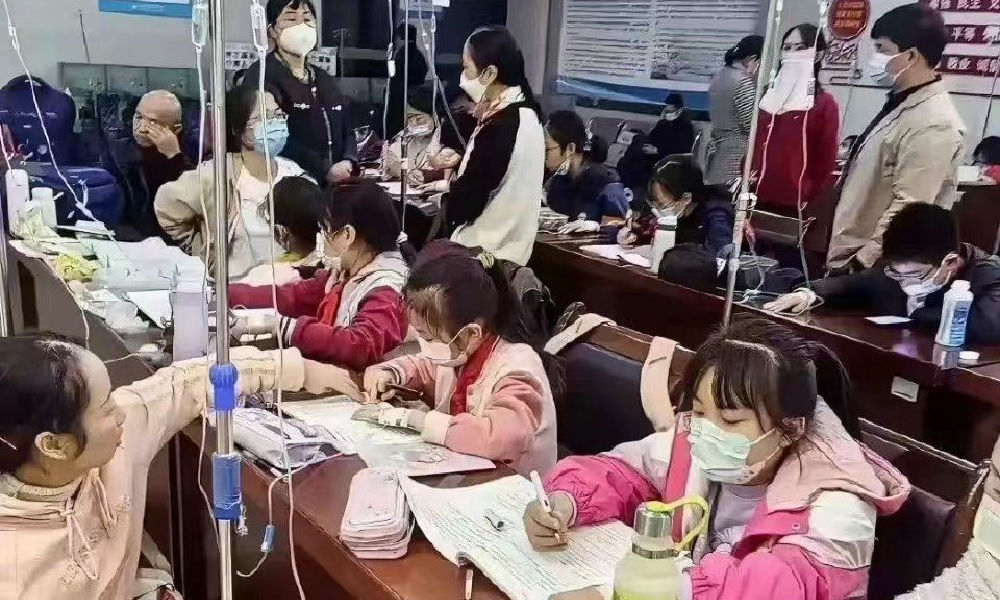
In the early morning of November 21, parents are already queuing up at Xi’an Children’s Hospital with their sons and daughters. It’s not even the line for a doctor’s appointment, but rather for the removal of IV needles.
The scene was captured in a recent video, only one among many videos and images that have been making their rounds on Chinese social media these days (#凌晨的儿童医院拔针也要排队#).
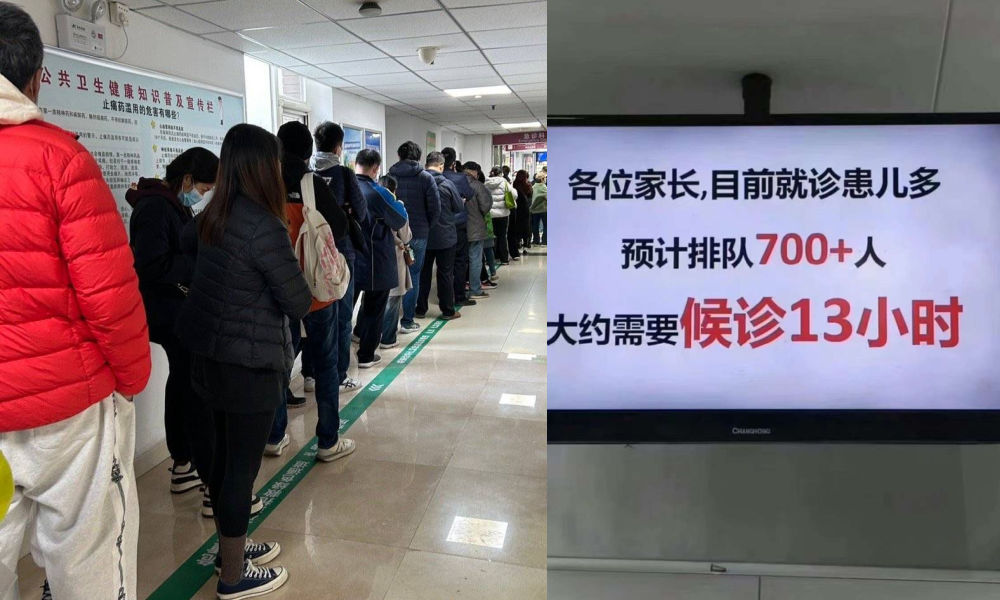
One photo shows a bulletin board at a local hospital warning parents that over 700 patients are waiting in line, estimating a waiting time of more than 13 hours to see a doctor.
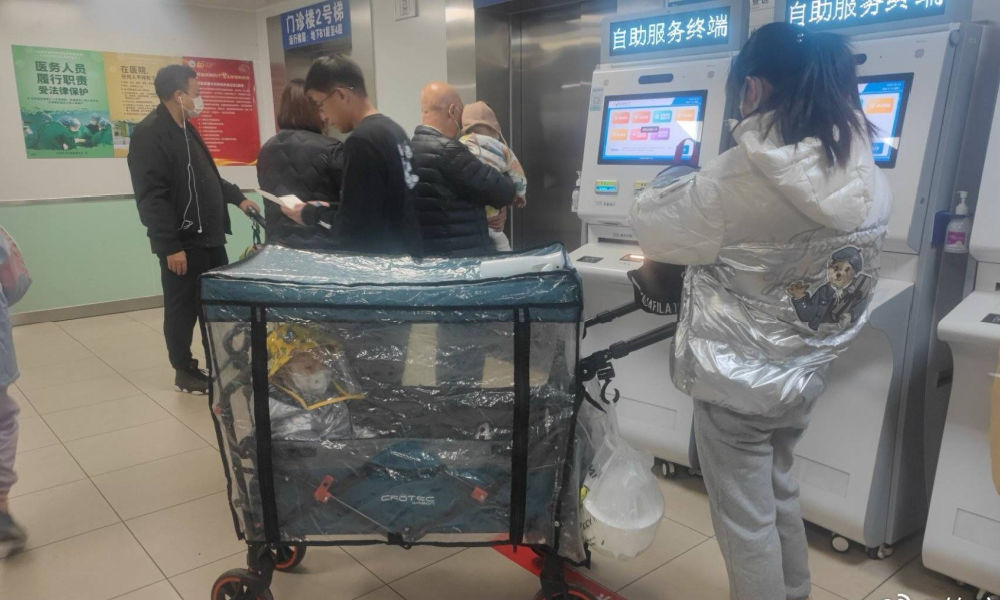
Another image shows children doing their homework while hooked up on an IV.

Recent discussions on Chinese social media platforms have highlighted a notable surge in flu cases. The ongoing flu season is particularly impacting children, with multiple viruses concurrently circulating and contributing to a high incidence of respiratory infections.
Among the prevalent respiratory infections affecting children are Mycoplasma pneumoniae infections, influenza, and Adenovirus infection.
The spike in flu cases has resulted in overcrowded children’s hospitals in Beijing and other Chinese cities. Parents sometimes have to wait in line for hours to get an appointment or pick up medication.
According to one reporter at Haibao News (海报新闻), there were so many patients at the Children’s Hospital of Capital Institute of Pediatrics (首都儿科研究所) on November 21st that the outpatient desk stopped accepting new patients by the afternoon. Meanwhile, 628 people were waiting in line to see a doctor at the emergency department.
Reflecting on the past few years, the current flu season marks China’s first ‘normal’ flu peak season since the outbreak of Covid-19 in late 2019 / early 2020 and the end of its stringent zero-Covid policies in December 2022. Compared to many other countries, wearing masks was also commonplace for much longer following the relaxation of Covid policies.
Hu Xijin, the well-known political commentator, noted on Weibo that this year’s flu season seems to be far worse than that of the years before. He also shared that his own granddaughter was suffering from a 40 degrees fever.
“We’re all running a fever in our home. But I didn’t dare to go to the hospital today, although I want my child to go to the hospital tomorrow. I heard waiting times are up to five hours now,” one Weibo user wrote.
“Half of the kids in my child’s class are sick now. The hospital is overflowing with people,” another person commented.
One mother described how her 7-year-old child had been running a fever for eight days already. Seeking medical attention on the first day, the initial diagnosis was a cold. As the fever persisted, daily visits to the hospital ensued, involving multiple hours for IV fluid administration.
While this account stems from a single Weibo post within a fever-advice community, it highlights a broader trend: many parents swiftly resort to hospital visits at the first signs of flu or fever. Several factors contribute to this, including a lack of General Practitioners in China, making hospitals the primary choice for medical consultations also in non-urgent cases.
There is also a strong belief in the efficacy of IV infusion therapy, whether fluid-based or containing medication, as the quickest path to recovery. Multiple factors contribute to the widespread and sometimes irrational use of IV infusions in China. Some clinics are profit-driven and see IV infusions as a way to make more money. Widespread expectations among Chinese patients that IV infusions will make them feel better also play a role, along with some physicians’ lacking knowledge of IV therapy or their uncertainty to distinguish bacterial from viral infections (read more here)
To prevent an overwhelming influx of patients to hospitals, Chinese state media, citing specialists, advise parents to seek medical attention at the hospital only for sick infants under three months old displaying clear signs of fever (with or without cough). For older children, it is recommended to consult a doctor if a high fever persists for 3 to 5 days or if there is a deterioration in respiratory symptoms. Children dealing with fever and (mild) respiratory symptoms can otherwise recover at home.
One Weibo blogger (@奶霸知道) warned parents that taking their child straight to the hospital on the first day of them getting sick could actually be a bad idea. They write:
“(..) pediatric departments are already packed with patients, and it’s not just Mycoplasma infections anymore. Cases include influenza, Covid-19, Norovirus, and Adenovirus. And then, of course, those with bad luck are cross-infected with multiple viruses at the same time, leading to endless cycles. Therefore, if your child experiences mild coughing or a slight fever, consider observing at home first. Heading straight to the hospital could mean entering a cesspool of viruses.”
The hashtag for “fever” saw over 350 million clicks on Weibo within one day on November 22.
Meanwhile, there are also other ongoing discussions on Weibo surrounding the current flu season. One topic revolves around whether children should continue doing their homework while receiving IV fluids in the hospital. Some hospitals have designated special desks and study areas for children.
Although some commenters commend the hospitals for being so considerate, others also remind the parents not to pressure their kids too much and to let them rest when they are not feeling well.
Opinions vary: although some on Chinese social media say it's very thoughtful for hospitals to set up areas where kids can study and read, others blame parents for pressuring their kids to do homework at the hospital instead of resting when not feeling well. pic.twitter.com/gnQD9tFW2c
— Manya Koetse (@manyapan) November 22, 2023
By Manya Koetse, with contributions from Miranda Barnes
Get the story behind the hashtag. Subscribe to What’s on Weibo here to receive our newsletter and get access to our latest articles:
Spotted a mistake or want to add something? Please let us know in comments below or email us. First-time commenters, please be patient – we will have to manually approve your comment before it appears.
©2023 Whatsonweibo. All rights reserved. Do not reproduce our content without permission – you can contact us at info@whatsonweibo.com.
China and Covid19
Repurposing China’s Abandoned Nucleic Acid Booths: 10 Innovative Transformations
Abandoned nucleic acid booths are getting a second life through these new initiatives.
Published
11 months agoon
May 19, 2023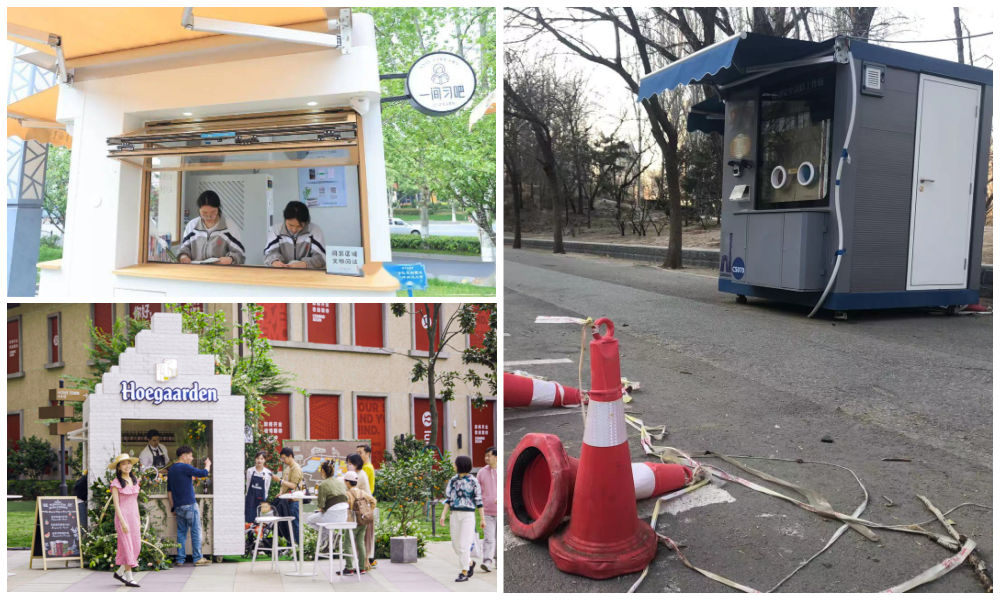
During the pandemic, nucleic acid testing booths in Chinese cities were primarily focused on maintaining physical distance. Now, empty booths are being repurposed to bring people together, serving as new spaces to serve the community and promote social engagement.
Just months ago, nucleic acid testing booths were the most lively spots of some Chinese cities. During the 2022 Shanghai summer, for example, there were massive queues in front of the city’s nucleic acid booths, as people needed a negative PCR test no older than 72 hours for accessing public transport, going to work, or visiting markets and malls.
The word ‘hésuān tíng‘ (核酸亭), nucleic acid booth (also:核酸采样小屋), became a part of China’s pandemic lexicon, just like hésuān dìtú (核酸地图), the nucleic acid test map lauched in May 2022 that would show where you can get a nucleic test.
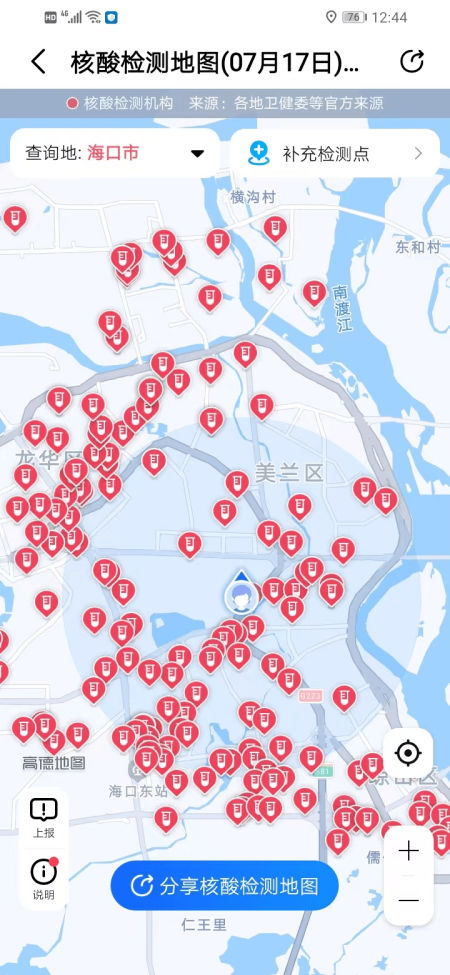
Example of nucleic acid test map.
During Halloween parties in Shanghai in 2022, some people even came dressed up as nucleic test booths – although local authorities could not appreciate the creative costume.
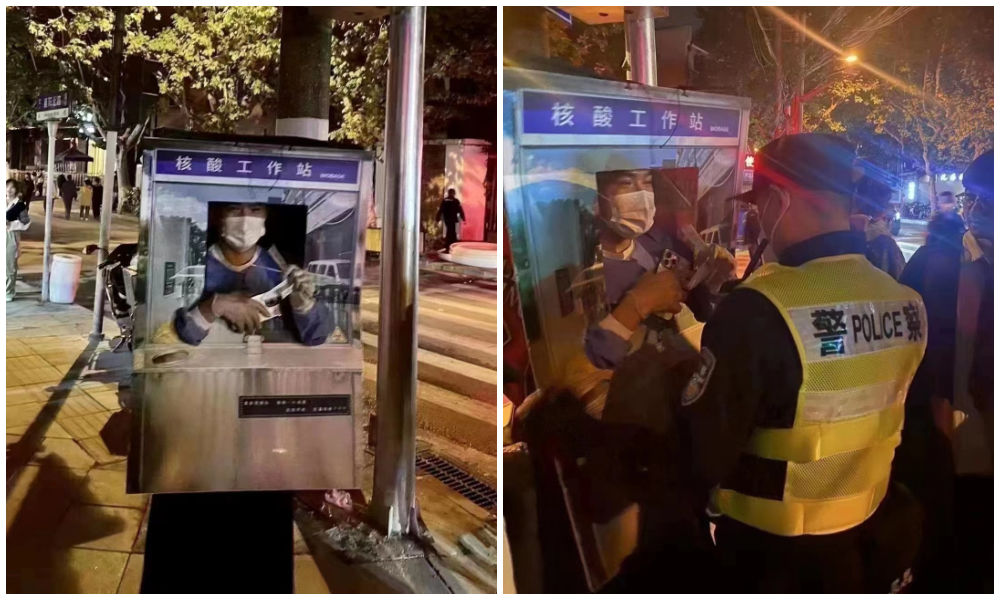
Halloween 2022: dressed up as nucliec acid booths. Via @manyapan twitter.
In December 2022, along with the announced changed rules in China’s ‘zero Covid’ approach, nucleic acid booths were suddenly left dismantled and empty.
With many cities spending millions to set up these booths in central locations, the question soon arose: what should they do with the abandoned booths?
This question also relates to who actually owns them, since the ownership is mixed. Some booths were purchased by authorities, others were bought by companies, and there are also local communities owning their own testing booths. Depending on the contracts and legal implications, not all booths are able to get a new function or be removed yet (Worker’s Daily).
In Tianjin, a total of 266 nucleic acid booths located in Jinghai District were listed for public acquisition earlier this month, and they were acquired for 4.78 million yuan (US$683.300) by a local food and beverage company which will transform the booths into convenience service points, selling snacks or providing other services.
Tianjin is not the only city where old nucleic acid testing booths are being repurposed. While some booths have been discarded, some companies and/or local governments – in cooperation with local communities – have demonstrated creativity by transforming the booths into new landmarks. Since the start of 2023, different cities and districts across China have already begun to repurpose testing booths. Here, we will explore ten different way in which China’s abandoned nucleic test booths get a second chance at a meaningful existence.
1: Pharmacy/Medical Booths
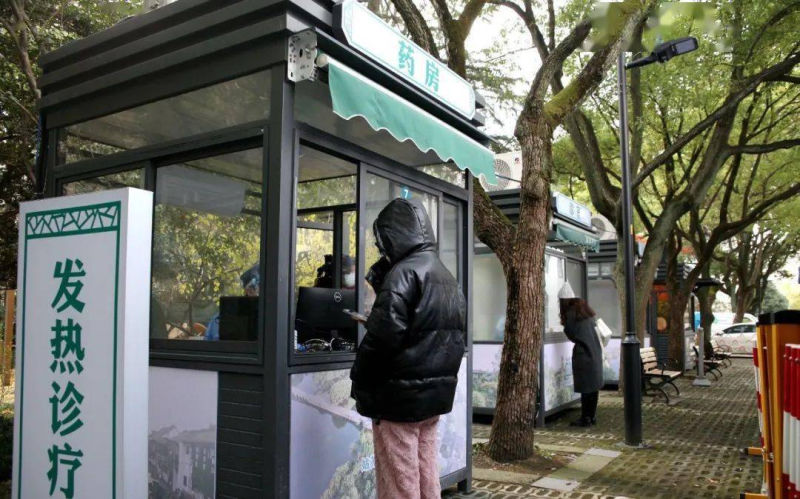
Via ‘copyquan’ republished on Sohu.
Blogger ‘copyquan’ recently explored various ways in which abandoned PCR testing points are being repurposed.
One way in which they are used is as small pharmacies or as medical service points for local residents (居民医疗点). Alleviating the strain on hospitals and pharmacies, this was one of the earliest ways in which the booths were repurposed back in December of 2022 and January of 2023.
Chongqing, Tianjin, and Suzhou were among earlier cities where some testing booths were transformed into convenient medical facilities.
2: Market Stalls
In Suzhou, Jiangsu province, the local government transformed vacant nucleic acid booths into market stalls for the Spring Festival in January 2022, offering them free of charge to businesses to sell local products, snacks, and traditional New Year goods.
The idea was not just meant as a way for small businesses to conveniently sell to local residents, it was also meant as a way to attract more shoppers and promote other businesses in the neighborhood.
3: Community Service Center

Small grid community center in Shizhuang Village, image via Sohu.
Some residential areas have transformed their local nucleic acid testing booths into community service centers, offering all kinds of convenient services to neighborhood residents.
These little station are called wǎnggé yìzhàn (网格驿站) or “grid service stations,” and they can serve as small community centers where residents can get various kinds of care and support.
4: “Refuel” Stations
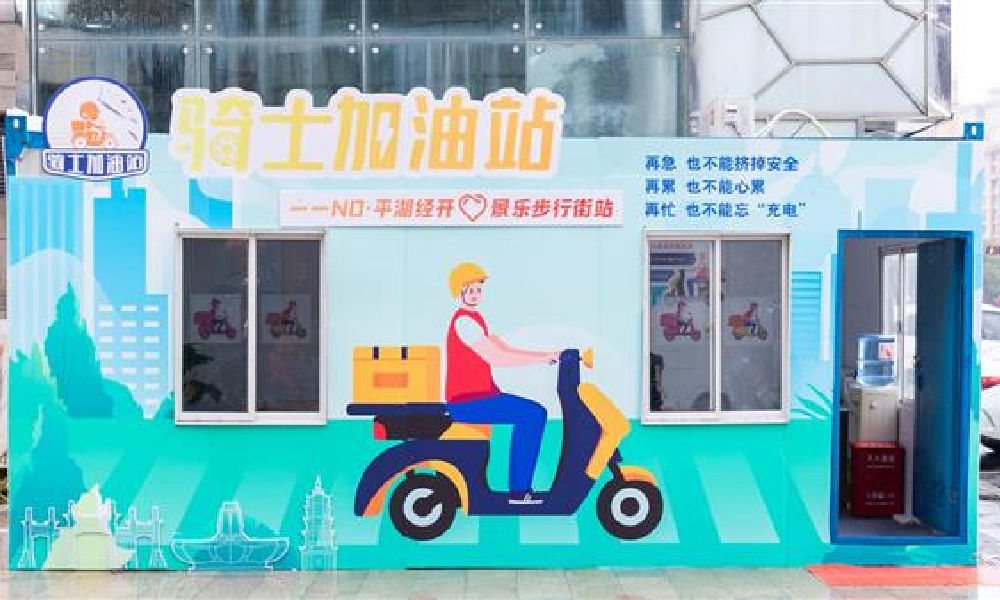
In February of this year, 100 idle nucleic acid sampling booths were transformed into so-called “Rider Refuel Stations” (骑士加油站) in Zhejiang’s Pinghu. Although it initially sounds like a place where delivery riders can fill up their fuel tanks, it is actually meant as a place where they themselves can recharge.
Delivery riders and other outdoor workers can come to the ‘refuel’ station to drink some water or tea, warm their hands, warm up some food and take a quick nap.
5: Free Libraries
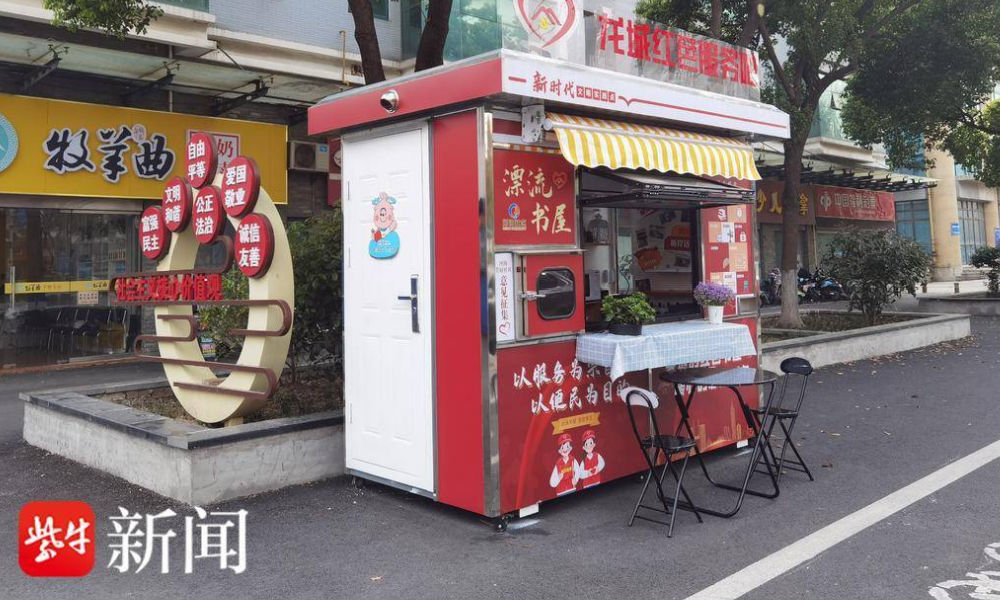
image via sohu.
In various Chinese cities, abandoned nucleic acid booths have been transformed into little free libraries where people can grab some books to read, donate or return other books, and sit down for some reading.
Changzhou is one of the places where you’ll find such “drifting bookstores” (漂流书屋) (see video), but similar initiatives have also been launched in other places, including Suzhou.
6: Study Space
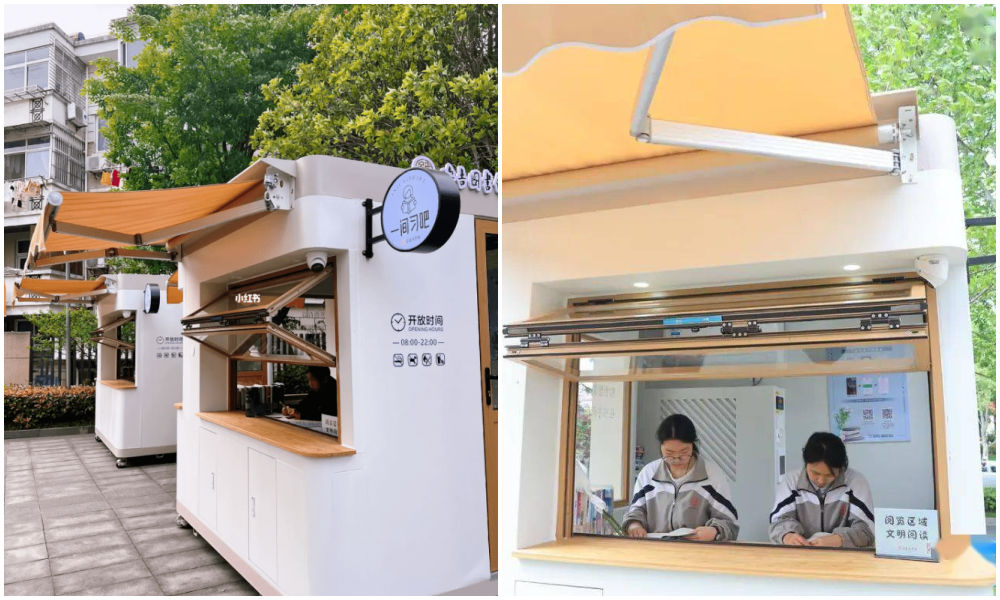
Photos via Copyquan’s article on Sohu.
Another innovative way in which old testing points are being repurposed is by turning them into places where students can sit together to study. The so-called “Let’s Study Space” (一间习吧), fully airconditioned, are opened from 8 in the morning until 22:00 at night.
Students – or any citizens who would like a nice place to study – can make online reservations with their ID cards and scan a QR code to enter the study rooms.
There are currently ten study booths in Anji, and the popular project is an initiative by the Anji County Library in Zhejiang (see video).
7: Beer Kiosk
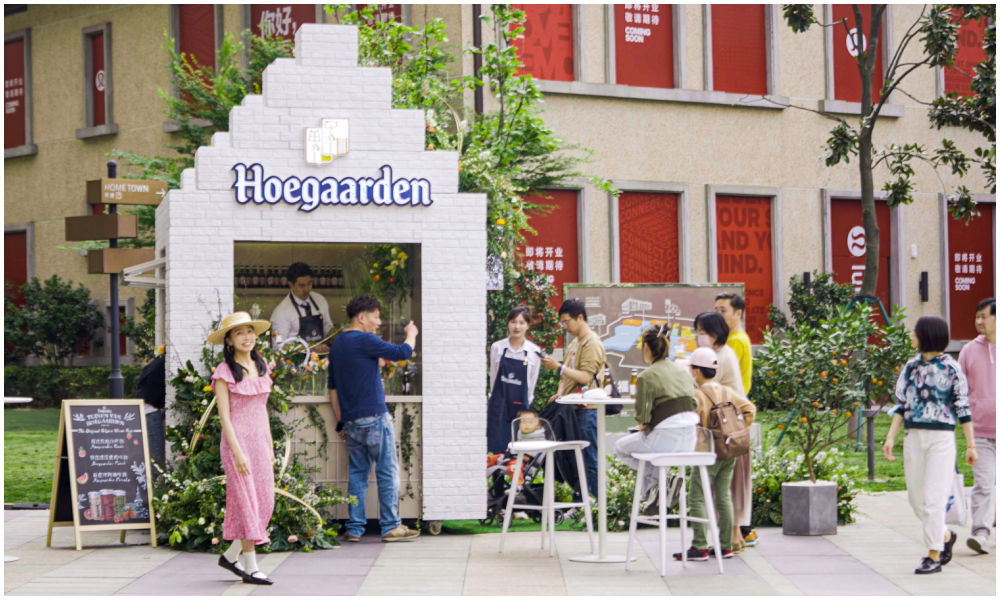
Hoegaarden beer shop, image via Creative Adquan.
Changing an old nucleic acid testing booth into a beer bar is a marketing initiative by the Shanghai McCann ad agency for the Belgium beer brand Hoegaarden.
The idea behind the bar is to celebrate a new spring after the pandemic. The ad agency has revamped a total of six formr nucleic acid booths into small Hoegaarden ‘beer gardens.’
8: Police Box
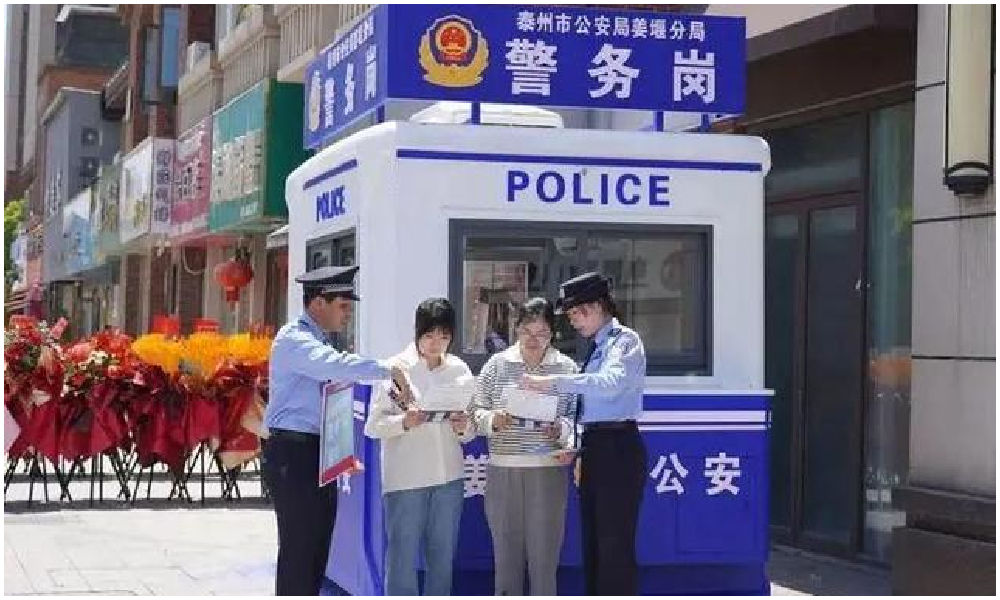
In Taizhou City, Jiangsu Province, authorities have repurposed old testing booths and transformed them into ‘police boxes’ (警务岗亭) to enhance security and improve the visibility of city police among the public.
Currently, a total of eight vacant nucleic acid booths have been renovated into modern police stations, serving as key points for police presence and interaction with the community.
9: Lottery Ticket Booths
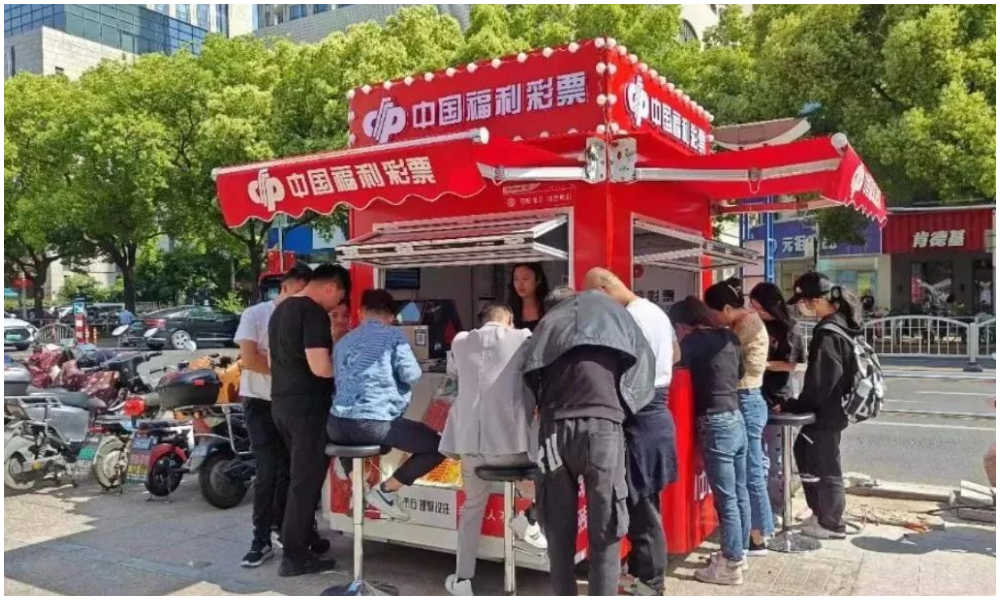
Image via The Paper
Some nucleic acid booths have now been turned into small shops selling lottery tickets for the China Welfare Lottery. One such place turning the kiosks into lottery shops is Songjiang in Shanghai.
Using the booths like this is a win-win situation: they are placed in central locations so it is more convenient for locals to get their lottery tickets, and on the other hand, the sales also help the community, as the profits are used for welfare projects, including care for the elderly.
10: Mini Fire Stations
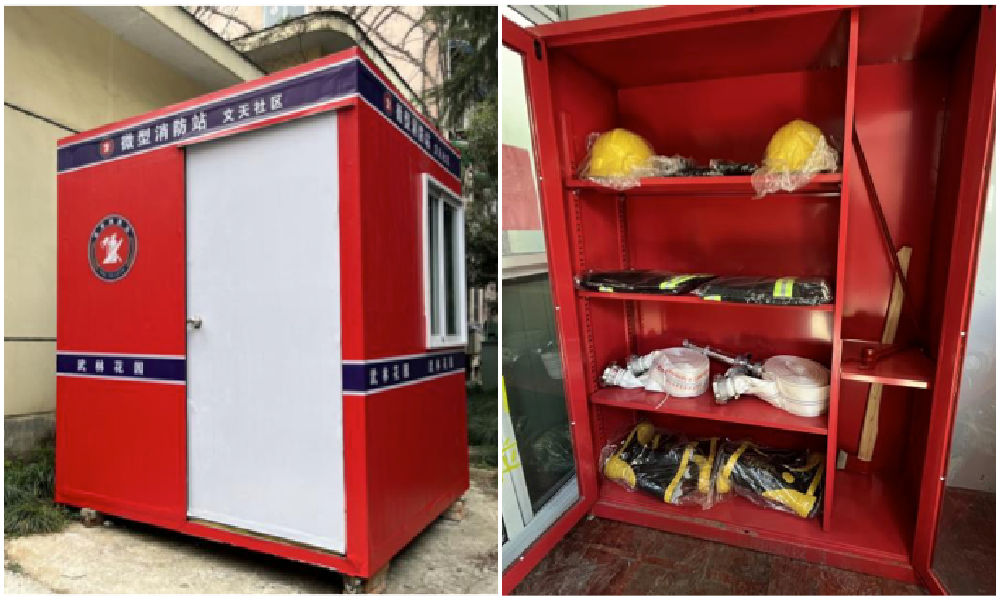
Micro fire stations, images via ZjNews.
Some communities decided that it would be useful to repurpose the testing points and turn them into mini fire kiosks, just allowing enough space for the necessary equipment to quickly respond to fire emergencies.
Want to read more about the end of ‘zero Covid’ in China? Check our other articles here.
By Manya Koetse,
Get the story behind the hashtag. Subscribe to What’s on Weibo here to receive our newsletter and get access to our latest articles:
Spotted a mistake or want to add something? Please let us know in comments below or email us. First-time commenters, please be patient – we will have to manually approve your comment before it appears.
©2023 Whatsonweibo. All rights reserved. Do not reproduce our content without permission – you can contact us at info@whatsonweibo.com.
Subscribe

Zara Dress Goes Viral in China for Resemblance to Haidilao Apron

“Old Bull Eating Young Grass”: 86-Year-Old Chinese Painter Fan Zeng Marries 36-Year-Old Xu Meng

Chengdu Disney: The Quirkiest Hotspot in China

Where to Eat and Drink in Beijing: Yellen’s Picks

Weibo Watch: Burning BMWs

The ‘Two Sessions’ Suggestions: Six Proposals Raising Online Discussions

Top 9 Chinese Movies to Watch This Spring Festival Holiday

Party Slogan, Weibo Hashtag: “The Next China Will Still Be China”

From Pitch to Politics: About the Messy Messi Affair in Hong Kong (Updated)

Looking Back on the 2024 CMG Spring Festival Gala: Highs, Lows, and Noteworthy Moments

Two Years After MU5735 Crash: New Report Finds “Nothing Abnormal” Surrounding Deadly Nose Dive

More than Malatang: Tianshui’s Recipe for Success

In Hot Water: The Nongfu Spring Controversy Explained

Weibo Watch: Stealing the Show

The Benz Guy from Baoding and the Granny Xu Line-Cutting Controversy
Get in touch
Would you like to become a contributor, or do you have any tips or suggestions? Get in touch here!
Popular Reads
-

 China Insight2 months ago
China Insight2 months agoThe ‘Two Sessions’ Suggestions: Six Proposals Raising Online Discussions
-

 China Arts & Entertainment2 months ago
China Arts & Entertainment2 months agoTop 9 Chinese Movies to Watch This Spring Festival Holiday
-

 China Media1 month ago
China Media1 month agoParty Slogan, Weibo Hashtag: “The Next China Will Still Be China”
-

 China World2 months ago
China World2 months agoFrom Pitch to Politics: About the Messy Messi Affair in Hong Kong (Updated)






Mike
March 24, 2022 at 1:14 am
Great article, thanks Manya. It’ll be interesting to see how it plays out, especially as some countries have moved on and the impact this has on local peoples’ psyches.
Pax Politica
March 25, 2022 at 5:03 am
My daughter enrolled in a Uni in China, she has been studying online from Indonesia for close to a year. Looking at how strict China is, we loose hope of it allowing International students to enter China next semester and has decided to find alternative country to transfer to. It is sad that we have to start over (finding a country she can experience) but we have wasted a year waiting for China to open up.
Wang
March 25, 2022 at 7:07 pm
There are two facets of China’s Zero COVID policy that the CCP will not mention: the ineffective Chinese vaccines and China’s under-resourced, poorly organized healthcare system. Outbreaks in China will cause more severe disease and overwhelm hospitals simply because the Sinovac and Sinopharm vaccines do not produce the level of immune response found with mRNA vaccines. The CCP had an opportunity to rectify this, since Pfizer has given Fosun Pharm a license to produce its mRNA vaccine in China. But the CCP will not allow this, in order to save face. While China cannot quickly address its inadequate healthcare system, there are measures the CCP can take to mitigate the pandemic in China – allow production of the BioNTech/Pfizer mRNA vaccine in China and start inoculating citizens. However, the CCP will never allow this, as they would then have to admit that China’s vaccines are inferior.